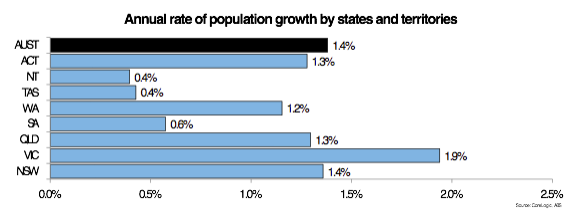Melbourne remains the powerhouse of population growth
Contact
Melbourne remains the powerhouse of population growth
The rate of population growth in Victoria is significantly higher than in all other states and territories.

Demographic data for the March 2016 quarter was released last week from the Australian Bureau of Statistics (ABS). The data showed that over the 12 months the national population increased by 1.4% which translates into an increase of 327,610 persons.
Looking at the two components of national population growth, they show that over the year natural increase (births minus deaths) was recorded at 146,763 persons while net overseas migration was recorded at 180,8467 persons. The annual rate of natural increase was -4.9% lower compared to the previous year while net overseas migration was 2.0% higher. Annual natural increase was up moderately over the quarter while net overseas migration was at its highest level since September 2014.
Across the individual states and territories, Victoria has been the standout for population growth, increasing by 1.9% over the past year. In all other states and territories the annual rate of population growth is lower than that of the national rate. Across these regions, annual population growth has been recorded at: 1.4% in New South Wales, 1.3% in Queensland, 0.6% in South Australia, 1.2% in Western Australia, 0.4% in Tasmania, 0.4% in Northern Territory and 1.3% in the Australian Capital Territory.
In terms of the raw number increase in population over the year, New South Wales recorded its lowest annual population increase since December 2013. In Victoria, the increase in population was its highest since June 2009. These two states combined accounted for two thirds of the total increase in national population over the year. Elsewhere, Queensland has recorded its greatest increase in population since December 2014, South Australia and Western Australia had their lowest increases since December 2004, Tasmania and Northern Territory each recorded a moderate rise in population increases while the Australian Capital Territory has seen its lowest annual increase since December 2014.
Turning to the components of state and territory population, we’ll focus on the two segments which really drive changes in the make-up of population growth which is net overseas migration and net interstate migration.
As mentioned, net overseas migration was recorded at 180,847 persons over the year to March 2016. The above chart shows the annual number of net overseas migrants across each state and territory and clearly show that overseas migrants are overwhelmingly choosing to settle in New South Wales or Victoria. Of the 180,847 net overseas migrants over the past year, almost three out of every four migrants (73.9%) settled in either New South Wales (39.1%) or Victoria (34.7%). Annual net overseas migration into New South Wales was at its highest level since September 2009 and in Victoria it was at its highest level since December 2009. In all other states and territories, net overseas migration is trending either flat or lower.
Net interstate migration is neutral at a national level but varies greatly between states and territories. Victoria (14,529), Queensland (10,118) and Tasmania (21) were the only states or territories with a positive read for net interstate migration. Across the other states and territories, the declines in population from net interstate migration were recorded at: -10,321 persons in New South Wales, -5,887 persons in South Australia, -5,624 persons in Western Australia, -2,451 persons in Northern Territory and -385 persons in the Australian Capital Territory. The annual rate of net interstate migration is at an historic high in Victoria and up 48.6% over the past 12 months. Net interstate migration into Queensland over the past year was at its highest annual level since December 2012 and up 63.3%. In Tasmania, it was the first positive read for annual net interstate migration since March 2011. Elsewhere, annual net interstate migration into New South Wales was at its lowest level since December 2013, in South Australia it was at its lowest level since June 1996 and in Western Australia it was the greatest annual decline on record.
Some clear trends are now emerging in the data with the rate of population growth in Victoria significantly higher than in all other states and territories. Victoria is benefiting from strong rates of both overseas and interstate migration. Victoria has consistently maintained an annual rate of population growth of at least 1.7% since December 2008. New South Wales is also seeing a comparatively strong rate of population growth albeit it is much slower than that of Victoria. These two states are attracting population growth because they are home to the strongest economies and therefore best job opportunities. These factors are acting as a magnet, attracting both interstate and overseas migrants to these states. Interstate migration has begun to slow into New South Wales while it is powering ahead in Victoria and showing early signs of a pick-up in Queensland. It seems as if the lack of affordability in Sydney’s housing market is leading to an increasing number of residents to leave the state. Furthermore, despite strong recent increases in Melbourne home values, its strong economy and relatively cheaper housing seems to be attracting an increasing number of Australians to Victoria.
See also:
Get to know Dominic Gibson of Melbourne Acquisitions
Sydney, Melbourne auctions still running hot
Eastern seaboard states drive population growth





